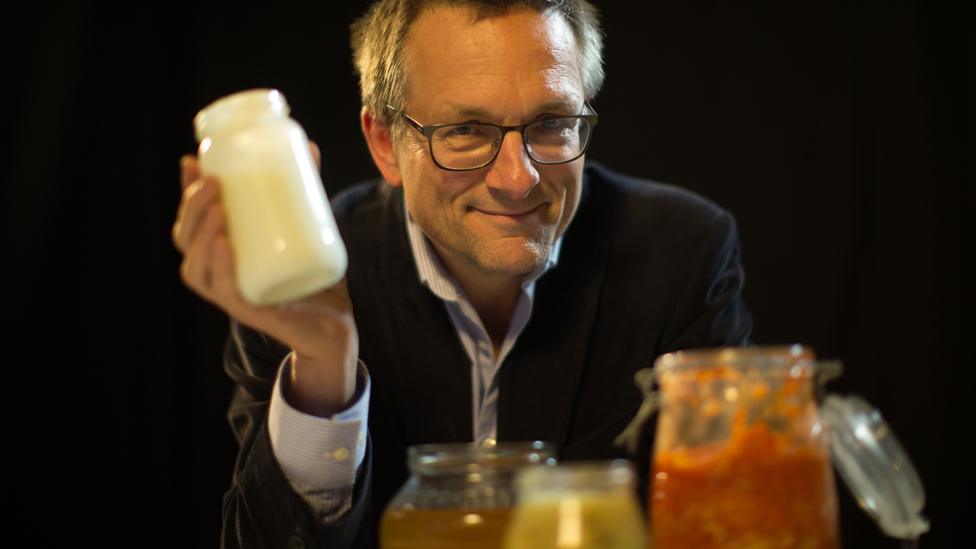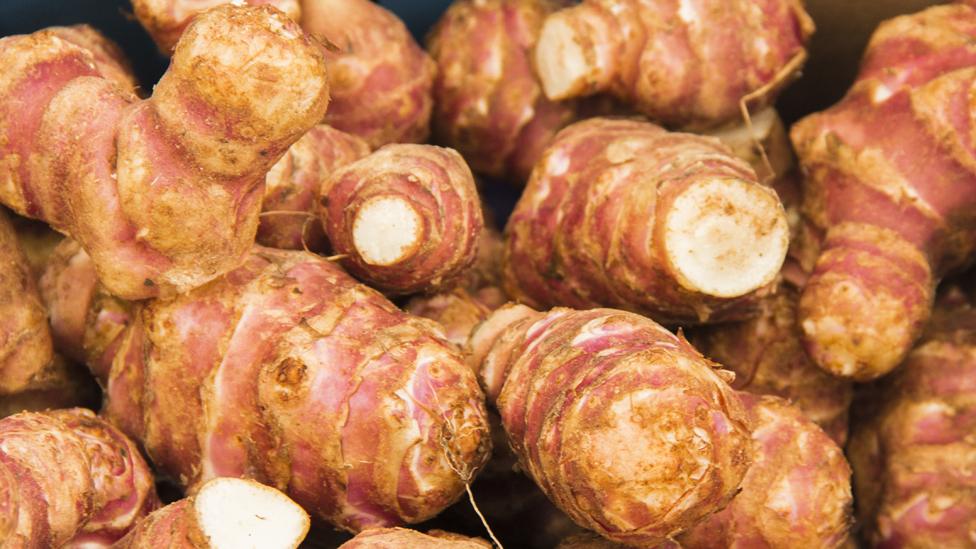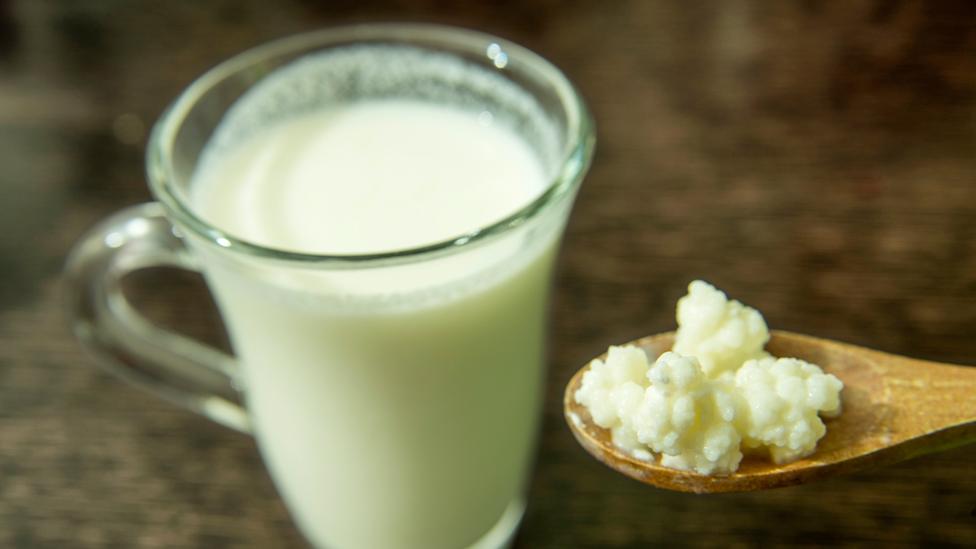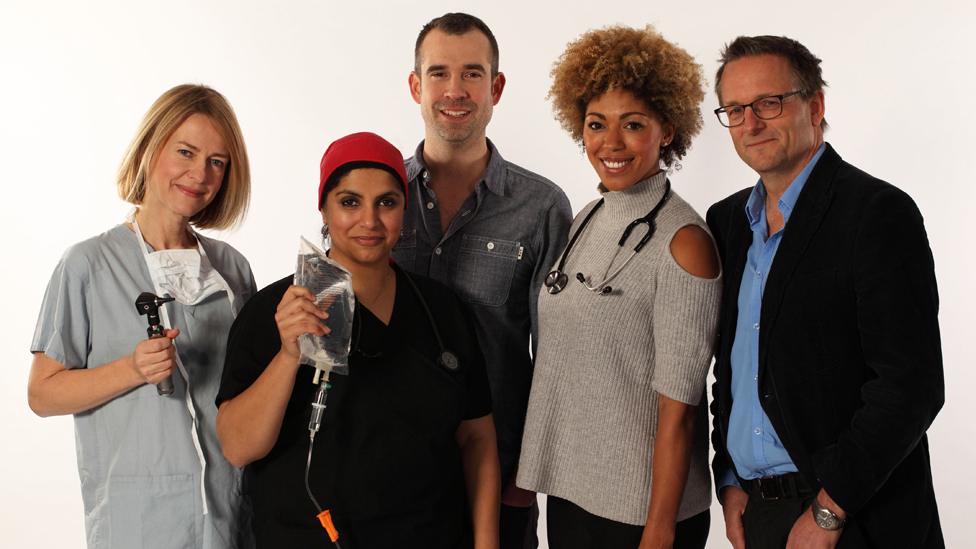Which foods can improve your gut bacteria?
- Published

Can what you eat change the bacteria in your gut for the better? Dr Michael Mosley has been finding out which foods and drinks can make the most difference.
The gut microbiome - the diverse community of bacteria that inhabits our intestines - is a hot topic in science right now.
Almost every day we come across headlines claiming that it has the power to influence our health in new and surprising ways, whether it's our weight, our mood or our ability to resist infection.
Unsurprisingly, given this explosion of interest in our inner ecosystem, our supermarket shelves and pharmacies now stock an array of probiotic products - products containing live bacteria and yeasts - that claim to be able to influence our gut microbiome for the better. But is any of this actually possible?
To find out, Trust Me, I'm A Doctor set up an experiment in Inverness with the help of NHS Highland and 30 volunteers and scientists around the country. We split our volunteers into three groups and over four weeks asked each group to try a different approach that, it's claimed, can boost gut bacteria for the better.

Lactobacillus casei - a bacterium found in the intestines and mouth
Our first group tried an off-the-shelf probiotic drink of the type found in most supermarkets. These drinks usually contain one or two species of bacteria that can survive the journey through our powerful stomach acid to set up home in our intestines.
Our second group tried a traditional fermented drink called kefir which contains an array of bacteria and yeast.
Our third group was asked to eat foods rich in a prebiotic fibre called inulin. Prebiotics are substances that feed the good bacteria already living in our guts, and inulin can be found in Jerusalem artichokes, chicory root, onions, garlic and leeks.

Jerusalem artichokes are rich in prebiotic fibre
What we found at the end of our study was fascinating. The group consuming the probiotic drink saw a small change in one bacteria type known to be good for weight management, bacteria called Lachnospiraceae. However this change wasn't statistically significant.
But our other two groups did see significant changes. The group eating foods rich in prebiotic fibre saw a rise in a type of bacteria known to be good for general gut health - something that is in line with other studies.
Our biggest change, however, was in the kefir group.

These volunteers saw a rise in a family of bacteria called Lactobacillales. We know that some of these bacteria are good for our overall gut health and that they can help conditions such as traveller's diarrhoea and lactose intolerance.
"Fermented foods by their very nature are quite acidic and so these microbes have had to evolve in order to cope with these sorts of environments so they're naturally able to survive in acid," says Dr Paul Cotter from the Teagasc Research Centre in Cork, who helped with our analysis. "That helps them to get through the stomach in order to then have an influence in the intestine below."
So we decided to investigate fermented foods and drinks further - we wanted to know what you should look for when selecting these products to get the best bacteria boost.
With the help of Dr Cotter and scientists at the University of Roehampton, we selected a range of homemade and shop-bought fermented foods and drinks and sent them off to the lab for testing.

Find out more

Trust Me, I'm A Doctor is on BBC Two at 20:00 GMT, Wednesday 1 February - catch up on BBC iPlayer

There were some striking differences between the products. While the homemade foods and products made by traditional methods contained a wide array of bacteria, some of the commercial products contained barely any.
"Typically, with commercial varieties, they would be subjected to pasteurisation after preparation to ensure their safety and extend their shelf life, which can kill off the bacteria, whereas that wouldn't be the case for the homemade varieties," says Dr Cotter.
So if you want to try fermented foods to improve your gut health it's best to look for products that have been made using traditional preparation and processing, or make them yourself, to ensure you're getting the healthy bacteria you're after.
Join the conversation on our Facebook page, external